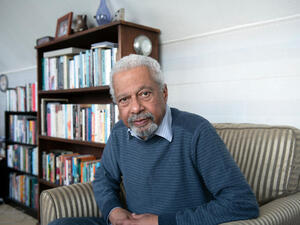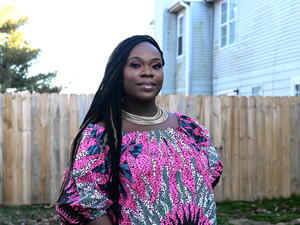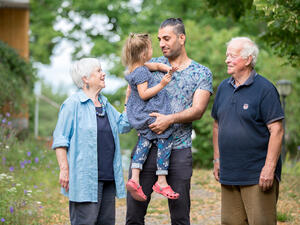UNHCR chief urges European Union to set a positive example on refugee protection
UNHCR chief urges European Union to set a positive example on refugee protection

High Commissioner António Guterres addresses the European Parliament.
BRUSSELS, Belgium, April 29 (UNHCR) - UN High Commissioner for Refugees António Guterres has called on the 27 countries of the European Union (EU) to set a positive example in the area of refugee protection.
In a lively debate on Wednesday with members of the European Parliament, Guterres said that in the EU, where internal borders have largely disappeared, people who seek protection should be able to find it wherever they apply for it. EU countries must do more to align their asylum systems, he stressed.
The High Commissioner also invited the EU to promote a stronger and more cohesive international response to new forms of forced displacement, including population movements caused by climate change and natural disasters.
Guterres' comments, days after he was elected by the UN General Assembly to a second five-year term as head of UNHCR, came during a joint session of the European Parliament's committees of justice and home affairs; development; and human rights. It was his first address to the parliament that took office last September and whose members represent some 490 million people.
The High Commissioner pointed out that the number of refugees and internally displaced people worldwide has remained relatively stable in recent years, as has the number of asylum applicants in the industrialized world. This shows both the resilience of conflicts and the difficulty of finding solutions.
"Crises are either not solved or - once solved - quickly slip back into instability or even open war," he said. As a consequence, the number of refugees UNHCR was able to help to return home in 2009 fell to under 400,000 - less than half the previous year's figure.
Guterres identified the shrinking of humanitarian space as a key concern, pointing to the increasing difficulty of delivering help to refugees and forcibly displaced people in countries in crisis. "In many parts of the world, we see growing threats to the security of humanitarian workers, including our own," he said.
He also drew attention to the numerous interlinked causes of forced displacement. "Climate change is an accelerating factor for displacement and instability," he said, "but water scarcity, food security, population growth and urbanization can all trigger conflict."
While UNHCR has no plans to seek a revision of the 1951 Refugee Convention, Guterres expressed the agency's interest in being a catalyst for a debate about how to deal with the human rights impacts of forced displacement in the 21st Century. "We need to find integrated approaches and we hope that the EU will help in this," he told parliamentarians.
Looking at asylum in the European context, the High Commissioner stressed that while states have the right and duty to manage their borders and to define their migration policies, they must do so in a way which respects international law. There must be safeguards, he said, to ensure that asylum seekers have access to territories and procedures where their claims can be examined.
He lamented the fact that, at present, many of those in need of international protection have little choice but to enter the EU by irregular means and, in so doing, may fall victim to smugglers and human traffickers. The rejection rate of asylum claims of people of one nationality can vary from 95 per cent in one country to near zero in another, he said, depending where the claim is made. "This is a dysfunctional situation, leading people to move irregularly within the Union."
During his debate with Euro MPs, Guterres described the situation in the European Union as contradictory. Although it is widely recognized that asylum challenges cannot be resolved exclusively at national level and that member states have committed to developing a Common European Asylum System, national sovereignty still often takes the upper hand. He supported changes proposed by the European Commission to five key EU laws on asylum, calling the proposals "an important step towards a true Common European Asylum System."
The High Commissioner also took advantage of this visit to Brussels to thank the European Commission and the EU member states for their consistent support of UNHCR's work, noting that together they provide more than 40 per cent of the refugee agency's annual budget.
By Gilles Van Moortel in Brussels, Belgium








